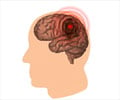- Medical and patient communities call on national policymakers in Latin America to take urgent action against preventable strokes that strike millions of people

Launched today at the International Society for Pharmacoeconomics and Outcomes Research (ISPOR) 3rd Latin America Conference, the report proposes measures to tackle stroke in patients with AF, the most common, sustained abnormal heart rhythm and a major cause of stroke.
"This is an epidemic that is already happening. Stroke is a serious public health threat in Latin America," said Dr. Carlos Cantú, Professor of Stroke Program at the Universidad Nacional Autónoma de México; Founding Member of the Mexican Stroke Association. "Compared with the general population, people with atrial fibrillation have a significantly higher risk of stroke and these strokes tend to be more severe, cause greater disability and have worse outcomes. It is therefore likely that these strokes incur greater costs to healthcare systems, survivors and their families."
Atrial Fibrillation-Related Strokes Are Preventable
Action for Stroke Prevention's report highlights the magnitude of the impact of stroke in Latin America and outlines measures to prevent stroke in people who have AF. The under-diagnosis of AF, as well as suboptimal use of anticlotting therapies and side-effects of current treatments, mean that an unnecessary and heavy burden is placed on patients, their families and carers, as well as healthcare systems across the region. There are simple actions, which if taken now could prevent a substantial number of deaths, disabilities, and costs resulting from stroke.
Action for Stroke Prevention's recommendations, which are endorsed by 37 medical and patient organizations from Latin America and around the world include:
- Improving awareness of the impact of AF and AF-related stroke
- Developing methods for early and adequate diagnosis of AF and stroke risk assessment
- Taking new and better approaches to prevent stroke in patients with AF
- Facilitating the exchange of best practice between national governments in Latin America
- Developing strategies to support adherence to guidelines
- Providing equal and adequate administration of therapy for patients with AF across countries in Latin America
- Advancing research into the causes, prevention and management of AF, and addressing the current paucity of epidemiological information in Latin America
Advertisement
Improving Access to Better Patient Care
Advertisement
"Policymakers and payers need to better understand AF and AF-related stroke to inform their decision making," said Trudie Lobban, Founder and Trustee, Arrhythmia Alliance, and co-founder and CEO, Atrial Fibrillation Association. "The risk of an AF-related stroke increases with age. We each have a one in four lifetime chance of developing AF so it is clear that there is an unmet medical need for stroke prevention in people with atrial fibrillation."
Patients with AF often do not have sufficient access to information about their condition and its treatment but a number of organizations are working to improve access to information on AF in Latin America.
"When diagnosed with AF, people can feel uniformed and unsupported. They are on an emotional rollercoaster living with the distress that can be caused by AF symptoms and the fear of stroke," said Mellanie True Hills, Founder and CEO of StopAfib.org. "It is essential that we remove the barriers to patient care, and support the improvement of patient and physician communication and education. If we act now – strategically and deliberately – prevention is possible."
Source-Eurekalert















